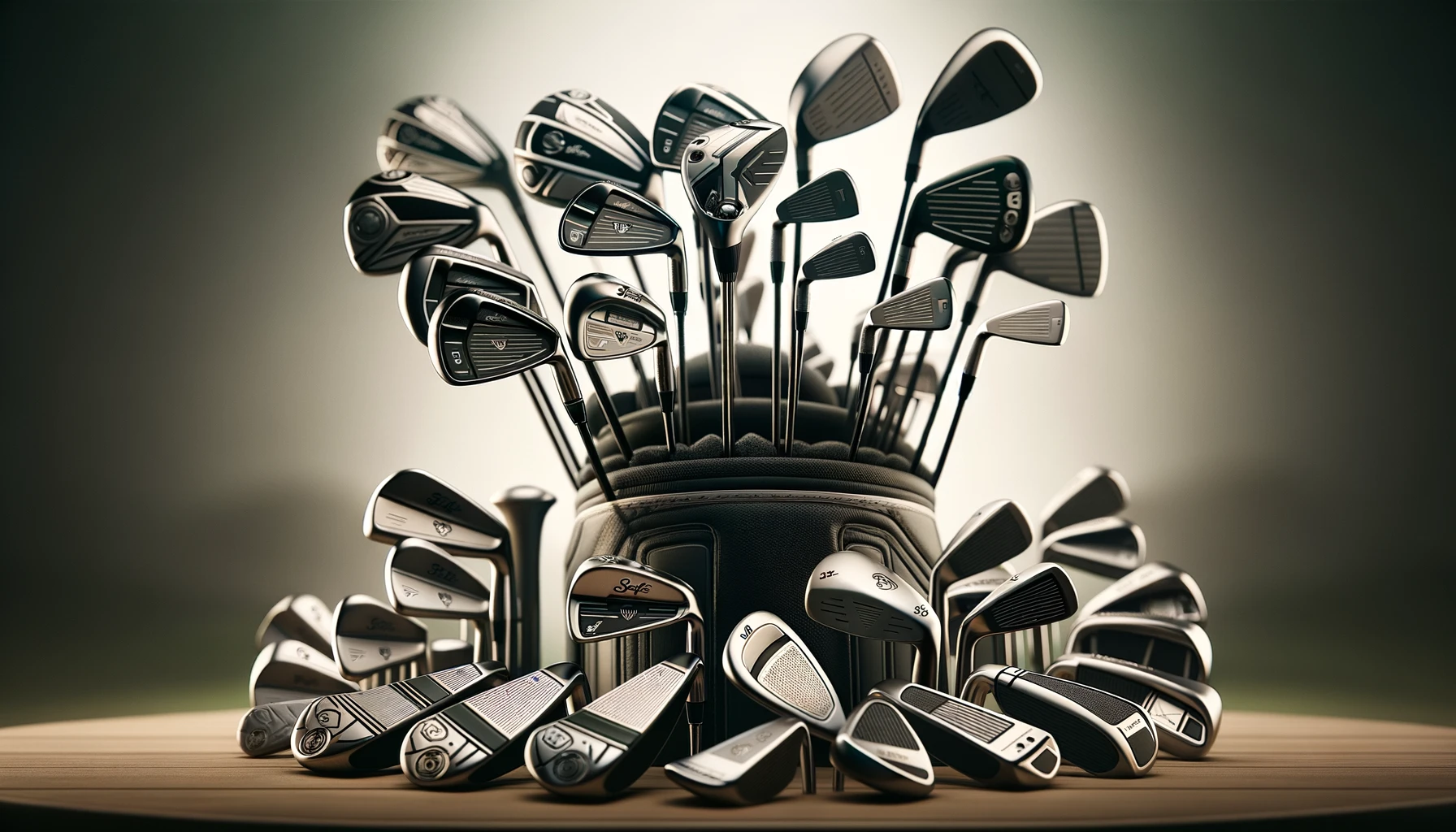You’ve finally decided to take up golf and you’re eager to get started, but where do you begin? Choosing the right golf clubs for beginners can seem like a daunting task, with so many options and technical jargon to navigate. However, fear not! In this article, we’ll provide you with practical tips and expert advice to help you select the perfect golf clubs that will make your journey into the world of golf an enjoyable and rewarding one. Whether you’re a complete novice or simply looking to upgrade your equipment, we’ve got you covered. Let’s get started on your path to becoming a golfing pro!

Consider Your Skill Level
When choosing golf clubs, it’s important to assess your skill level. Are you a beginner with little to no experience, or have you been playing for some time? This will help guide you in selecting the right clubs that will best suit your abilities.
Assess Your Golfing Experience
Take some time to evaluate your golfing experience. Have you taken lessons, or are you self-taught? Understanding your level of knowledge and proficiency will allow you to make more informed decisions when choosing your clubs.
Determine Your Swing Speed
Another important aspect to consider is your swing speed. This refers to how fast your clubhead travels through the air during your swing. Knowing your swing speed will help you choose the right golf clubs with the appropriate shaft flex, which we will discuss later.
Understand the Different Types of Golf Clubs
Before diving into specifics, it’s essential to understand the different types of golf clubs available. Golf clubs can be categorized into several main types: woods, irons, hybrids, wedges, and putters. Each type serves a unique purpose and is designed for specific shots on the golf course.
Woods
Woods, also known as drivers and fairway woods, are typically used for long-distance shots off the tee or in the fairway. They have larger clubheads and longer shafts, making them ideal for maximum distance.
Irons
Irons are versatile clubs that can be used for various shots on the golf course. They are typically numbered from 3 to 9, with lower numbers representing clubs designed for longer shots and higher numbers for shorter shots. Irons are known for their precision and ability to control the ball’s trajectory.
Hybrids
Hybrids are a combination of woods and irons, designed to provide the best characteristics of both. They are often used as alternatives to long irons, offering forgiveness and easier launch.
Wedges
Wedges are specialized clubs used for shots that require a high degree of precision and control. They are typically used for shots around the green, such as bunker shots or chip shots. Different types of wedges include pitching wedges, sand wedges, and lob wedges.
Putters
Putters are essential for the final strokes on the green. They are used to roll the ball into the hole and require a steady hand and precise control. Putters come in various styles, including blade putters, mallet putters, and counterbalanced putters.
Determine Your Budget
It’s important to set a realistic budget when considering golf clubs. Golf can be an expensive sport, but there are options available for every price range.
Set a Realistic Budget
Take some time to evaluate how much you are willing to invest in your golf clubs. Consider the frequency of your golfing activities and how much you are willing to allocate towards your equipment. Keep in mind that while higher-end clubs may offer advanced features and technology, they may not always be necessary for beginners.
Consider Buying Used Clubs
If you’re on a tighter budget or simply want to explore more options, consider buying used clubs. Many golfers sell their well-maintained clubs at a fraction of the original price. Just make sure to inspect the clubs for any visible wear or damage before finalizing the purchase.
Get Properly Fitted
To get the most out of your golf clubs, it’s crucial to get properly fitted. This involves visiting a golf club professional and trying out different clubs to find the perfect fit for your swing.
Visit a Golf Club Professional
A golf club professional will have the expertise to assess your swing and recommend the appropriate clubs. They can analyze your technique, evaluate your swing speed, and help determine the best club specifications for your game. Schedule a fitting session with a professional to ensure your clubs are tailored to your needs.
Try Out Different Clubs
During your fitting session, make sure to try out different clubs. Experiment with different brands, models, and shaft types to find what feels most comfortable and produces the best results. Pay attention to factors such as weight, grip size, and overall feel. It’s important to find clubs that inspire confidence and make you feel in control.

Consider Your Physical Attributes
Your physical attributes, such as height, weight, and hand size, can also influence your club selection. Take these factors into account when choosing golf clubs.
Height
Taller golfers may benefit from longer clubs, while shorter golfers may find shorter clubs easier to handle. If possible, try out clubs of different lengths to determine what feels most comfortable for your height.
Weight
Consider your body weight when selecting golf clubs. If you have a stronger build, you may prefer heavier clubs for added control. Conversely, if you have a smaller build, lighter clubs may be easier to swing.
Hand Size
Hand size can affect grip comfort and control. If you have larger hands, you may prefer clubs with thicker grips. Conversely, if you have smaller hands, thinner grips may feel more comfortable. Experiment with different grip sizes to find the right fit for you.
Choose the Right Shaft Flex
The shaft flex of your golf clubs plays a crucial role in distributing energy during your swing. It’s important to understand shaft flex and select the appropriate one for your swing speed.
Understand Shaft Flex
Shaft flex refers to the measure of a shaft’s ability to bend during the swing. Different shaft flexes are designed for varying swing speeds. The most common flexes are extra stiff (X), stiff (S), regular (R), seniors (A), and ladies (L).
Select the Appropriate Flex for Your Swing
Choosing the appropriate shaft flex is crucial for optimal performance. If your swing speed is fast and aggressive, a stiff or extra stiff flex may be suitable. If your swing speed is slower, a regular or seniors flex may provide better results. Getting fitted by a professional can help determine the best shaft flex for your swing.
Decide on Clubhead Material
Golf clubheads are typically made from three main materials: stainless steel, graphite, and titanium. Understanding the characteristics of each material can help you make an informed decision.
Stainless Steel
Stainless steel clubheads are commonly used in irons and wedges. They offer durability, forgiveness, and a solid feel upon impact. Stainless steel clubheads are often preferred by beginner golfers due to their affordability and reliability.
Graphite
Graphite clubheads are lightweight and flexible, providing increased swing speed and distance. They are commonly found in drivers and fairway woods. Graphite clubheads are ideal for golfers with slower swing speeds or those seeking more distance.
Titanium
Titanium clubheads are known for their lightweight yet strong nature. They are often found in higher-end drivers and offer enhanced forgiveness and distance. Titanium clubheads are popular among experienced golfers looking for maximum performance.
Consider Clubhead Size
The size of the clubhead can also impact your game. Understanding the differences between conventional and oversized clubheads will help you make an informed choice.
Conventional vs. Oversized Clubheads
Conventional clubheads have a smaller profile and offer more control and workability. They require precision and a consistent swing to achieve desired results. Oversized clubheads, on the other hand, have a larger sweet spot, providing more forgiveness and distance even on off-center hits.
Choose the Size Based on Your Skill Level
The size of the clubhead is often associated with the player’s skill level. Beginners may find it easier to use oversized clubheads due to their forgiveness, while experienced golfers may prefer the control offered by conventional clubheads. Consider your skill level and comfort when choosing the size of your clubhead.

Research Golf Club Brands
When choosing golf clubs, it’s essential to consider the reputation and quality of different brands. Researching and reading reviews can provide valuable insights into the performance and reliability of various golf club brands.
Consider Reputation and Quality
Dedicate some time to researching reputable golf club brands. Look for companies with a strong presence in the golfing industry and a history of producing high-quality clubs. Reading customer reviews and seeking recommendations from fellow golfers can help narrow down your options.
Read Reviews and Seek Recommendations
Reading reviews from both professionals and fellow golfers can be incredibly helpful in making your decision. Look for reviews that discuss aspects such as performance, durability, and overall satisfaction. Additionally, reach out to friends, golfing partners, or instructors for their recommendations and personal experiences.
Consider Your Future Goals
Finally, it’s important to consider your future goals in golf when choosing your clubs. Evaluating your commitment to the sport and the potential for improvement can guide you in selecting the right golf clubs that will support your long-term aspirations.
Evaluate Your Commitment to Golf
Ask yourself how committed you are to golf and how often you plan to play. If you foresee playing regularly and dedicating time to practice and improvement, investing in higher-quality clubs may be beneficial. On the other hand, if you are unsure about the future of your golfing journey, starting with more budget-friendly options might be the best choice.
Consider Upgrading as You Improve
As your skills develop and your swing improves, you may find it necessary to upgrade your golf clubs. Consider this progression when choosing your clubs, ensuring that they provide room for growth and improvement. Avoid clubs that are too advanced for your current skill level, as they may hinder progress and make the game less enjoyable.
In conclusion, choosing the right golf clubs involves considering various factors such as skill level, swing speed, club types, budget, physical attributes, shaft flex, clubhead material and size, brand reputation, and future goals. By thoroughly evaluating each of these aspects and seeking professional advice when needed, you can find the perfect set of golf clubs that will enhance your game and bring you joy on the golf course for years to come. Happy golfing!


